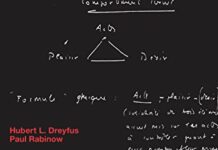
Ebook Info
- Published: 2008
- Number of pages: 624 pages
- Format: PDF
- File Size: 5.45 MB
- Authors: Hubert L. Dreyfus
Description
A Companion to Phenomenology and Existentialism is a complete guide to two of the dominant movements of philosophy in the twentieth century. Written by a team of leading scholars, including Dagfinn Føllesdal, J. N. Mohanty, Robert Solomon, Jean-Luc MarionHighlights the area of overlap between the two movementsFeatures longer essays discussing each of the main schools of thought, shorter essays introducing prominent themes, and problem-oriented chaptersOrganised topically, around concepts such as temporality, intentionality, death and nihilismFeatures essays on unusual subjects, such as medicine, the emotions, artificial intelligence, and environmental philosophy
User’s Reviews
Reviews from Amazon users which were colected at the time this book was published on the website:
⭐This volume is a welcome addition to Blackwell’s excellent series of “companions” to philosophical figures and schools. Its focus is important–it acknowledges implicitly that phenomenology has a variety of dimensions, but also that existentialism played a key role in the development of phenomenology. It also insists, rightly, that existentialism should not be understood outside of its phenomenological roots. Dreyfus and Wrathall are a marvelous team in their own writing, and they have done their usual impeccable job gathering clear-thinking and clear-writing scholars to produce a truly helpful volume for students of philosophy at all levels.
⭐This is my review. It is a review for the above title. The above title is less of a philosophical companion than just a collection of essays which have served as my companion, philosophically.
⭐Decent enough information for readers interested in these heavy subjects, but the design and layout of the book by the publishers is a travesty. I recommend the kindle version instead.The text justification is inept, particularly on the left hand side pages, where the text on the right side of those pages can’t be easily read without tugging the book to flatten a page. Breaking the spine is the only way to remedy this issue.Why this layout? It’s inexplicable. And what is more, the left margin of both left and right pages is massive. So no margin on the spine side of the left pages, but an enormous margin on the right of those same pages. Great going.Less than 100 pages in and you’ll be breaking the spine to view the text on left hand side pages.Certain pages have misaligned body text in relation to the pages, like poor photocopies. This makes text look slightly slanted. Maybe this book was printed in Taiwan or some Slavic country.Who knows? Something retarded has occurred at any rate, and for an over-priced academic tome, readers are being ripped off.The kindle version is better, although it is difficult, even when enlarging text, to tell commas from periods. When the text is decreased, it’s almost impossible to tell the difference.It’s hard to see why Blackwell Publishing considers itself “outstanding.” It must be run by megalomaniacs.Please note that when you read about the works of a historical figure, a philosopher such as Hegel or Heidegger, you are reading just that – something ABOUT them.Most of what Heidegger had to say has already been extrapolated and understood by top academics back in the 70s, 80s and even 90s, leaving little more to add or say. However, academics aren’t willing to leave things like that. They need to keep the pots stirred to maintain their cushy professional positions. This is achieved not by reiterating Heidegger, or diligently explaining his works, but by re-interpreting them.Read original works and be careful when going to secondary interpreters. Not all of them mean well, and a great many wish to lead you astray by misrepresenting and even denigrating the work of independent minds. abusing their positions of trust, and working with their academic seniors (controllers) and publishers to subtly (and not so subtly) deface great ideas.The best written and clearest chapter is, oddly, at the end of the book. Chapter 36 by Michael Allen Gillespie is written in plain unambiguous language, whereas most of the other essays in this compendium are highly technical and impossible to understand unless you are familiar with philosophy of this kind.The pomposity of Mark Wrathall’s writing is particularly annoying. Since Herbert Dreyfus passed away recently, Wrathall knows he’ll step into his teacher’s shoes, and apparently its gone to his head. His impossibly technical style is comprehensible to about five people in the world – all of them squinting eggheads. Gillespie’s essay puts him and a lot of other show-offs to shame.Every single aspect of Heidegger’s complex thought can be explained in clear, concise terms that laymen can grasp. So when you encounter the alternative, you’re dealing with academic hubris and asinine one-upmanship that serves no one except the ladder climbing Quasimodo desperate to impress his cronies and secure tenure.For the most part, the scholars featured in this “Companion” comprise an inbred clutch whose essays frequently appear in high profile collections and compendiums. This can give the impression that this group – Dreyfus, Okrent, Blattner, Wrathall, and co, are the supremely insightful interpreters of Heidegger’s work. Actually, we need not accept this wholesale. It might be to our detriment. Their work is useful, there’s no denying that. But there are many scholars outside this self-appointed mob that have written infinitely more succinct and insightful works, for example:William J. Richardson (one of the original American Heideggerians)William Barrett (Irrational Man)Heath Massey (The Origin of Time)Richard Sembera (Rephrasing Heidegger)Steven Crowell (Transcendental Heidegger)Michael Zimmerman (Eclipse of Self)Thomas Langan (The Meaning of Heidegger)and especially Richard J. Capobianco (Heidegger’s Way of Being)While reading works on Heidegger from any and all so-called experts and authorities, remember that it is more than possible that not a single one of them, for all their insight and intellectual competence, LIVES the type of life deemed authentic by Heidegger. They are card-carrying socialists and school-teachers, which is already a black mark against them if ever there was one. To LIVE Heidegger’s philosophy is a very different matter, and as your experience increases you’ll realize that few if any commenters are interested in that aspect of the great man’s teachings on time and identity.Be aware also that this thick allegedly definitive compendium lacks any essay on Heidegger’s interest in Chinese Taoism (Daoism). What an scandalous omission that is. I highly recommend the superlative work of Katrin Froese (“Nietzsche, Heidegger and Daoist Thought”), and Reinhard May (Heidegger’s Hidden Sources).*** *** ***
⭐I have just received mine and thus I obviously have not read all the essays contained in it; I have read, though, a couple of them and, while I mean no disrespect toward the authors, I have found some of them rather weak. I must confess I have found Dreyfus’s essay (“The roots of existentialism”) disappointing, since he constructs his reading on Pascal, Kierkegaard, Dostoevsky and Nietzsche, leaving thus Rousseau, Schelling and others virtually unmentioned. T. Carman’s “The concept of Authenticity” is also quite disappointing, since he, pretty much like Dreyfus, opts for a reading based on authors (Kierkegaard, Heidegger and Sartre), while one could try to approach the issue in a more analytic fashion. Wrathal’s (“Existential Phenomenology”) and Udo Tietz’s (“German Existence-Phil.”), in turn, are quite solid, as are probably many others. In sum, I really expected more from some of these authors, who are, in turn, well known scholars in this area of research; my whole point is that I have felt the need of other books in order to complement some of these essays.
⭐An excellent collection of essays and papers .Highly recommended.
⭐fine
Keywords
Free Download A Companion to Phenomenology and Existentialism (Blackwell Companions to Philosophy Book 39) 1st Edition in PDF format
A Companion to Phenomenology and Existentialism (Blackwell Companions to Philosophy Book 39) 1st Edition PDF Free Download
Download A Companion to Phenomenology and Existentialism (Blackwell Companions to Philosophy Book 39) 1st Edition 2008 PDF Free
A Companion to Phenomenology and Existentialism (Blackwell Companions to Philosophy Book 39) 1st Edition 2008 PDF Free Download
Download A Companion to Phenomenology and Existentialism (Blackwell Companions to Philosophy Book 39) 1st Edition PDF
Free Download Ebook A Companion to Phenomenology and Existentialism (Blackwell Companions to Philosophy Book 39) 1st Edition


